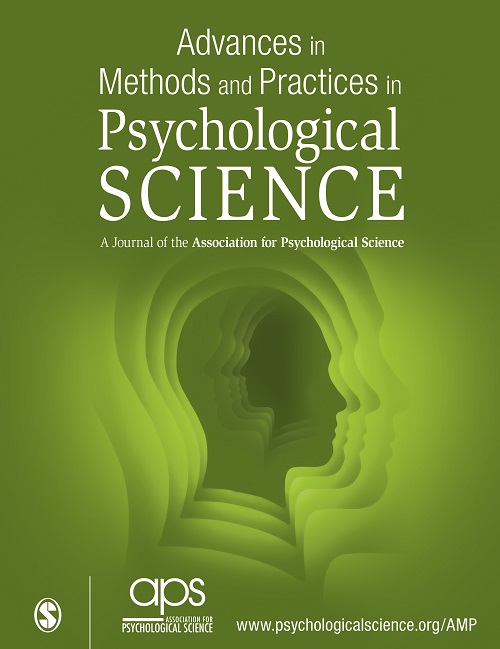Modeling Cluster-Level Constructs Measured by Individual Responses: Configuring a Shared Approach
IF 13.4
1区 心理学
Q1 PSYCHOLOGY
Advances in Methods and Practices in Psychological Science
Pub Date : 2023-07-01
DOI:10.1177/25152459231182319
引用次数: 0
Abstract
When multiple items are used to measure cluster-level constructs with individual-level responses, multilevel confirmatory factor models are useful. How to model constructs across levels is still an active area of research in which competing methods are available to capture what can be interpreted as a valid representation of cluster-level phenomena. Moreover, the terminology used for the cluster-level constructs in such models varies across researchers. We therefore provide an overview of used terminology and modeling approaches for cluster-level constructs measured through individual responses. We classify the constructs based on whether (a) the target of measurement is at the cluster level or at the individual level and (b) the construct requires a measurement model. Next, we discuss various two-level factor models that have been proposed for multilevel constructs that require a measurement model, and we show that the so-called doubly latent model with cross-level invariance of factor loadings is appropriate for all types of constructs that require a measurement model. We provide two illustrations using empirical data from students and organizational teams on stimulating teaching and on conflict in organizational teams, respectively.通过个体响应测量的集群级结构建模:配置共享方法
当使用多个项目来测量具有个体水平反应的集群水平结构时,多水平验证性因素模型是有用的。如何对跨层次的结构进行建模仍然是一个活跃的研究领域,在这个领域中,可以使用相互竞争的方法来捕捉可以被解释为集群层次现象的有效表示的内容。此外,这类模型中用于集群级结构的术语因研究人员而异。因此,我们概述了通过个体反应测量的集群级结构所使用的术语和建模方法。我们根据(a)测量目标是在集群级别还是在个体级别以及(b)结构需要测量模型来对结构进行分类。接下来,我们讨论了为需要测量模型的多级结构提出的各种两级因子模型,并证明了具有因子负载跨级别不变性的所谓双潜模型适用于所有需要测量模型类型的结构。我们使用来自学生和组织团队的经验数据,分别提供了关于激励教学和组织团队冲突的两个例子。
本文章由计算机程序翻译,如有差异,请以英文原文为准。
求助全文
约1分钟内获得全文
求助全文
来源期刊
CiteScore
21.20
自引率
0.70%
发文量
16
期刊介绍:
In 2021, Advances in Methods and Practices in Psychological Science will undergo a transition to become an open access journal. This journal focuses on publishing innovative developments in research methods, practices, and conduct within the field of psychological science. It embraces a wide range of areas and topics and encourages the integration of methodological and analytical questions.
The aim of AMPPS is to bring the latest methodological advances to researchers from various disciplines, even those who are not methodological experts. Therefore, the journal seeks submissions that are accessible to readers with different research interests and that represent the diverse research trends within the field of psychological science.
The types of content that AMPPS welcomes include articles that communicate advancements in methods, practices, and metascience, as well as empirical scientific best practices. Additionally, tutorials, commentaries, and simulation studies on new techniques and research tools are encouraged. The journal also aims to publish papers that bring advances from specialized subfields to a broader audience. Lastly, AMPPS accepts Registered Replication Reports, which focus on replicating important findings from previously published studies.
Overall, the transition of Advances in Methods and Practices in Psychological Science to an open access journal aims to increase accessibility and promote the dissemination of new developments in research methods and practices within the field of psychological science.

 求助内容:
求助内容: 应助结果提醒方式:
应助结果提醒方式:


